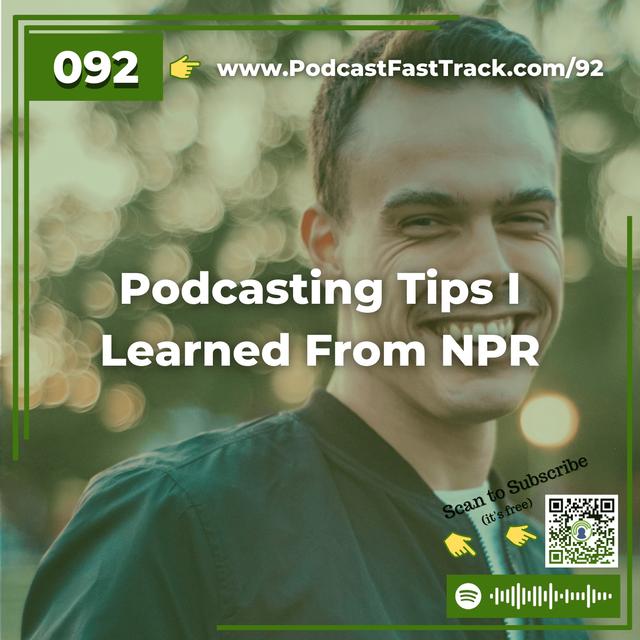
92: Podcasting Tips I Learned From NPR
Episode description
I figure, if I want to learn podcasting tips that can help my show stand apart in the crowded podcastosphere, I might as well go to the people who have made a living from doing audio well.
And I also got a little help from a new friend - a guy named Cal Newport. Well, Cal's not actually my friend, but he's like a long-distance mentor via his books and interviews.
Cal's book "So Good They Can't Ignore You" inspired me to work at becoming the very best I can be in a chosen field.
The field I've chosen: Podcasting.
So.... reading a book by the folks at NPR about audio reporting and recording was right up the alley of my learning curve.
This episode is about the podcasting tips I learned from the good folks at NPR.Main Points : Podcasting Tips from NPR- [4:09] The benefits of audio (why we are audio people)
- [7:10] NPRs tips for making good recordings
- [16:28] Best practices for working with a co-host
- [20:50] Tips for doing better interviews
Podcasting tip #1 : Get clear on the benefits of good audio
As I said, the folks at NPR are a wealth of knowledge when it comes to recording and producing great audio. We podcasters can learn a ton from them and the book “Sound Reporting” outlines a lot of those valuable principles.
Here’s a sampling of the points the author shares about the benefits of good audio… keep in mind, he spoke in terms of audio in general. I changed the points to reflect our particular form of audio, podcasting.
- Podcasts are portable (for the listener)
There’s a benefit to audio that you can’t get with video or theater, or any other form of communication. That’s its portability. People can listen on the treadmill, in the car, in the backyard pushing a lawn mower… anywhere.
That makes audio powerful in terms of its ABILITY to be consumed by the end user.
- Podcasts are intimate (spoken to one)
Yes, we want to have more than just one person listening to our podcasts. But when we think in terms of the individual person who may be listening, it opens up a whole new perspective that enables us to be more effective.
When you’re recording, imagine yourself speaking to one person - just one.
How would your manner change? What sort of voice tone and inflection would you use? How nervous would you be? Do you see the point?
This is a tip you can apply to your podcasting that could make your process and actual outcome more effective because it’s more effective.
- Podcasts are nimble (easy to do anywhere)
- Few things affect us like the sound of the human voice
There are lots of sounds that impact us. The sound of a siren. The bell that rings to end classes at school. The screeching of brakes.
But the sound of a human voice is more powerful than any of those. It is filled with meaning, emotion, depth, significance, much more than anything else we hear.
Podcasting enables us to make the most of that reality. We’re able to use the human voice, perhaps the most powerful communication tool in the world, to impact the lives of other people.
- Sound tells a story
We all love a good story. That’s why movies - and now narrative style podcasts - are so popular. Stories are told primarily through sound.
Yes, a skillful drawing or painting can tell a story of sorts, but it’s not as complete, not as impacting as a story told through the spoken word. Even words on a page are not as powerful. Notice how the audio book genre is growing?
These are just a few of the podcasting tips I learned reading the book, “Sound Reporting.” I hope you’ll pick up a copy and read it for...
